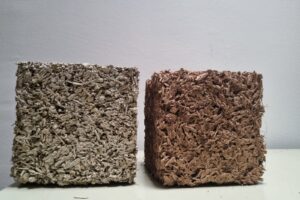
UPC will be present in the Smart City Expo World Congress 2025
October 6, 2025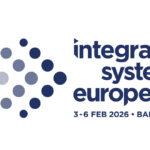
The UPC will be present in ISE 2026
November 12, 2025
UPC will be present in the Smart City Expo World Congress 2025
October 6, 2025
The UPC will be present in ISE 2026
November 12, 20256/11/2025
Once again, the Universitat Politècnica de Catalunya - BarcelonaTech (UPC) has taken part in the Smart City Expo World Congress (SCEWC25), held from 4 to 6 November in Barcelona, with several live demonstrations and presentations showcasing technology in areas such as energy and environment, infrastructures and smart building, mobility, inclusion, and advanced digital solutions. As part of the congress, the UPC has also participated in parallel sessions and round tables, and the Barcelona Deep Tech Summit, where companies from the University’s entrepreneurial ecosystem (18 spin-offs and start-ups) have presented their latest innovations.
The Universitat Politècnica de Catalunya - BarcelonaTech (UPC), through the UPC Technology Center (CIT UPC), once again has its own stand at the Smart City Expo World Congress, from 4 to 6 November at the Fira de Barcelona Gran Via venue. At stand number 60 (Hall P3, Level 0, Street E), has showcased a selection of highlighted projects—detailed on the website smartcity.upc.edu:
- BioSAFE: new construction solutions for façades and other building elements made from biomaterials that improve buildings’ acoustic quality and fire safety, while promoting a more comfortable and sustainable urban environment. These materials are based on renewable sources such as wood, bamboo and agricultural by-products. The project is led by the Interdisciplinary Group on Building Science and Technology (GICITED) at the University.
- SATE VEG: a system for the energy refurbishment of buildings that helps mitigate the urban heat island effect by improving energy efficiency and contributing to urban re-naturalisation. This innovative type of external thermal insulation features a living plant coating that provides variable thermal performance throughout the year, enhances biodiversity and has a positive effect on people’s health. Made from organic materials, the system requires low maintenance and minimal water consumption. It has been developed by researchers from the Architecture, Energy and Environment (AiEM) group at the UPC.
- BITSDRAIN: permeable and porous pavements as sustainable drainage solutions. As extreme rainfall events become more frequent due to climate change, and with urban expansion disrupting the natural hydrological cycle and reducing rainwater infiltration, these materials can reduce flood risks during heavy rain events and ease the burden on drainage networks. The project has been developed by the Fluvial Dynamics and Hydrological Engineering (FLUMEN) and Construction Materials and Roads (MATCAR) research groups at the UPC, in collaboration with the company Sorigué.
- RELUM: new reflective and photoluminescent pavements for urban areas that reduce heat absorption and retention, helping to mitigate the urban heat island effect and global warming. These materials, which combine ultra-thin bituminous mixes with various aggregates and pigments, enable urban surfaces to absorb less solar radiation and thus lower local temperatures. This project is also led by the MATCAR research group.
- DISCOVER: an advanced system for identifying and analysing materials in built environments at the end of their life cycle. It uses an autonomous robotic platform and artificial intelligence and Building Information Modelling (BIM) technologies to turn end-of-life buildings into reusable resource banks. The project aims to transform the demolition and construction waste sector, driving circularity by promoting material reuse and reducing greenhouse gas emissions. It has been developed by a multidisciplinary team from the Industrial Equipment Design Centre (CDEI), the Geophysics and Earthquake Engineering (GiES) group, and the Structures Analysis and Technology research group.
- La Volta: an architectural symbol for Barcelona combining traditional construction and contemporary innovation. This project aims to build a landmark Catalan-vault pergola on the Llars Mundet campus to merge historic masonry techniques with modern structural innovation, led by the Rehabilitation and Architectural Restoration Research Group (REARQ) at UPC.
- CIRC-BOOST: Circular solutions in the construction sector. The initiative seeks to accelerate the uptake of integrated circular solutions across construction value chains via five European pilot projects, coordinated by UPC’s Concrete Sustainability and Smart Structures (C3S) research group, part of the Construction Engineering (EC) group at UPC.
- An interactive map to identify and assess the vulnerability of Barcelona’s housing to extreme heat. This study developed an interactive vulnerability map of Barcelona’s housing stock to support climate-adaptation strategies, conducted by the Architecture, Energy and Environment (AiEM) research group at UPC.
- UPCxels: Open and Multisectoral Data Space Based on Artificial Intelligence. Led by the Intelligent Data Science and Artificial Intelligence (IDEAI-UPC) group, the project will create an open multisectoral data-space platform enabling businesses and institutions to securely share and monetise data via AI-driven analytics.
- E-MED: Towards a more efficient and sustainable public transport in the Euro-Mediterranean region. Via the Barcelona Innovative Transportation (BIT), CER-AMA and CARNET groups at UPC, this project validates solutions for energy- and resource-efficient public transport systems across the Euro-Mediterranean region.
- FIREPRIME: Tools and Services to Improve Wildfire Safety and Prevention in Europe. Coordinated by the CERTEC at UPC, this project develops a toolkit (mobile app, guidelines, training) for wildfire resilience in communities and infrastructure across Europe, focusing on wild-urban interface zones.
- Spot4Dis: Smart Mapping of Accessible Parking Spaces. Conducted by the inLab FIB research group at UPC together with AsoPMR, the project uses AI and satellite imagery to map accessible parking spaces for persons with reduced mobility and improve urban mobility inclusion.
- OCEAN: Application for Optimising Energy Consumption in High-Power Electrical Devices. The CITCEA at UPC developed a smart wireless application to optimise electricity consumption of high-power devices, enhancing energy efficiency in industry and infrastructure.
- MERIT: An international educational ecosystem aimed at bridging Europe’s digital skills gap. The Digital Europe MERIT project will build a pan-European educational ecosystem offering reskilling and up-skilling in AI, IoT and cybersecurity via a new Master’s programme and lifelong learning programmes.
- EU.FFICIENT: Co-creation, the future of collaborative innovation in Europe. This initiative supports the creation and validation of Communities of Expert Facilitators across sectors to strengthen co-creation practices, with CIT UPC participating via research and training activities.
One of the demonstrations at the UPC stand has focused on the radiant environment of an urban space —Barcelona’s Plaça de la Virreina. Using 3D glasses, visitors will be able to view a spherical thermographic image of the square, an innovative tool that reveals energy flows affecting pedestrian thermal comfort. This visualisation offers a new perspective for environmental design in architecture and urban planning, helping to create more comfortable and sustainable spaces. The project has been developed by the AiEM research group at the UPC.
At the Smart City Expo World Congress, other UPC technological capabilities and smart city services have also been presented, including the Connèxia UPC programme, a far-reaching 360º alliance for knowledge transfer between the University and industry. Nine UPC spin-offs will also be featured: Algorae, Aridditive, Beamagin, Hypergraph, Honext, Process Talks, Smart Engineering, Sparsity and TecknoCEA. Additionally, the UPC will showcase its portfolio of scientific and technical services for smart cities in areas such as computing and data processing, Industry 4.0, artificial intelligence, communication systems, and construction and infrastructure.
The UPC’s entrepreneurial ecosystem at the Barcelona Deep Tech Summit
Within the framework of the Smart City Expo World Congress, the Barcelona Deep Tech Summit has also taken place, promoted by Barcelona City Council in collaboration with the UPC and the universities of Barcelona (UB), the Autonomous University of Barcelona (UAB), the Open University of Catalonia (UOC) and Pompeu Fabra University (UPF). The event aimed at discussing the potential of deep tech as a tool to address humanity’s future challenges.
This edition, held at the same Fira Barcelona Gran Via venue (Hall 3), includes From Lab to Market as one of its key themes. Within this framework, the UPC has presented Next Frontier Founders, its acceleration and investment readiness programme for start-ups and spin-offs created by university entrepreneurs. The initiative is sponsored by Fractus and supported by the Fractus-UPC Deep Tech Hub.
The programme From Science to Market has also been presented, organised by the UPC together with the UB, UAB, UPF, the University of Girona and the University of Vic, to foster technology and knowledge transfer.
In addition, 18 technology-based companies (spin-offs and start-ups) emerging from the University have showcased their business initiatives at exhibition stands and have participated in Pitching Sessions on 4 and 5 November: Biyiud, BrainFocus, Datlantis, Folgrid Technologies, Geoskop, Haptika Medical Technologies, Hypergraph, IKUSA Cybersecurity, Kreios Space, Mapsi Photonics, MEETOPTICS, Mesai, MICA Eco, Muvity, NIMBLE Diagnostics, Process Talks, TECHWICH, Virmedex and Virtual. Some of these have also been part of the Next Frontier Founders programme.
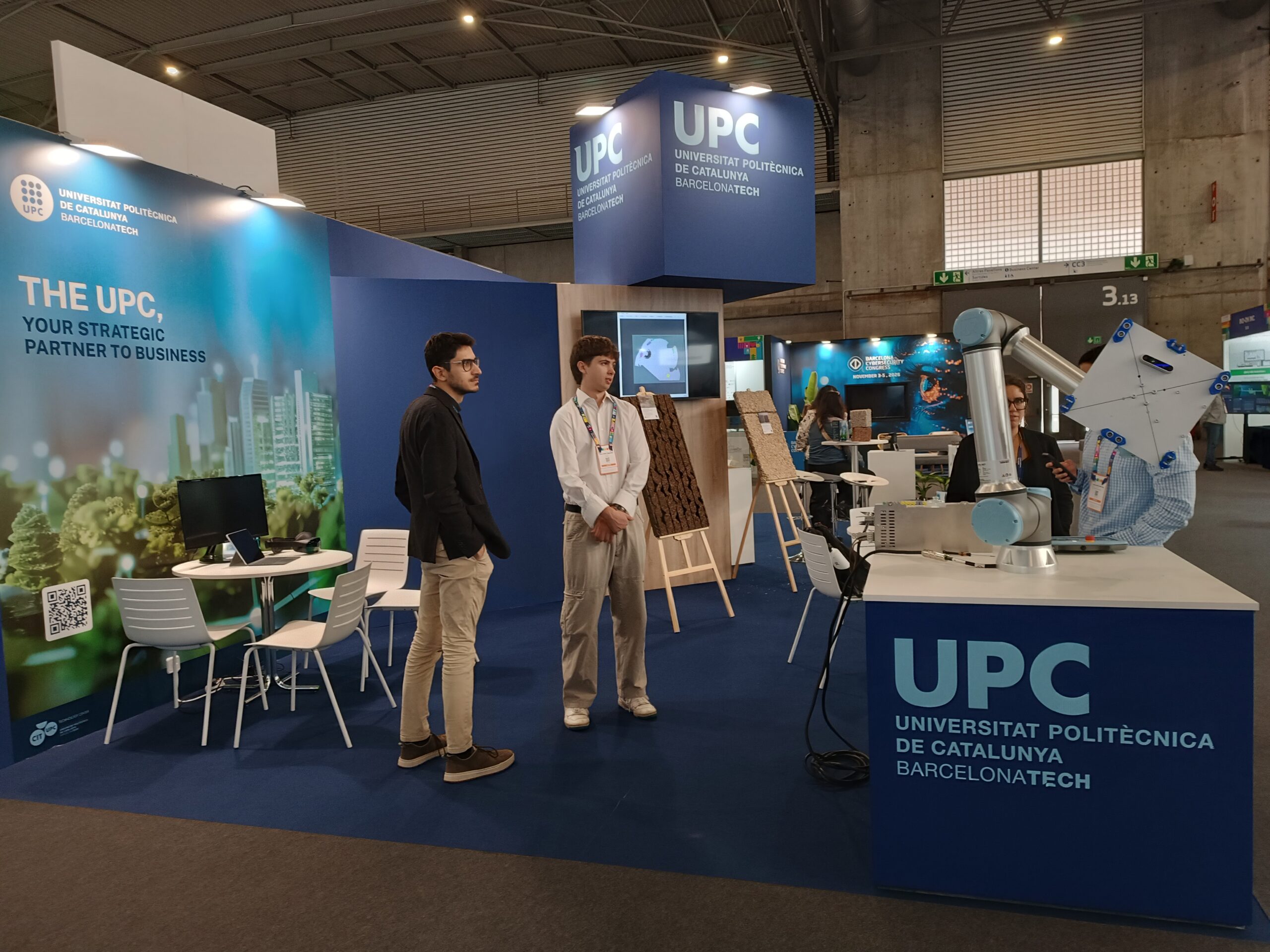
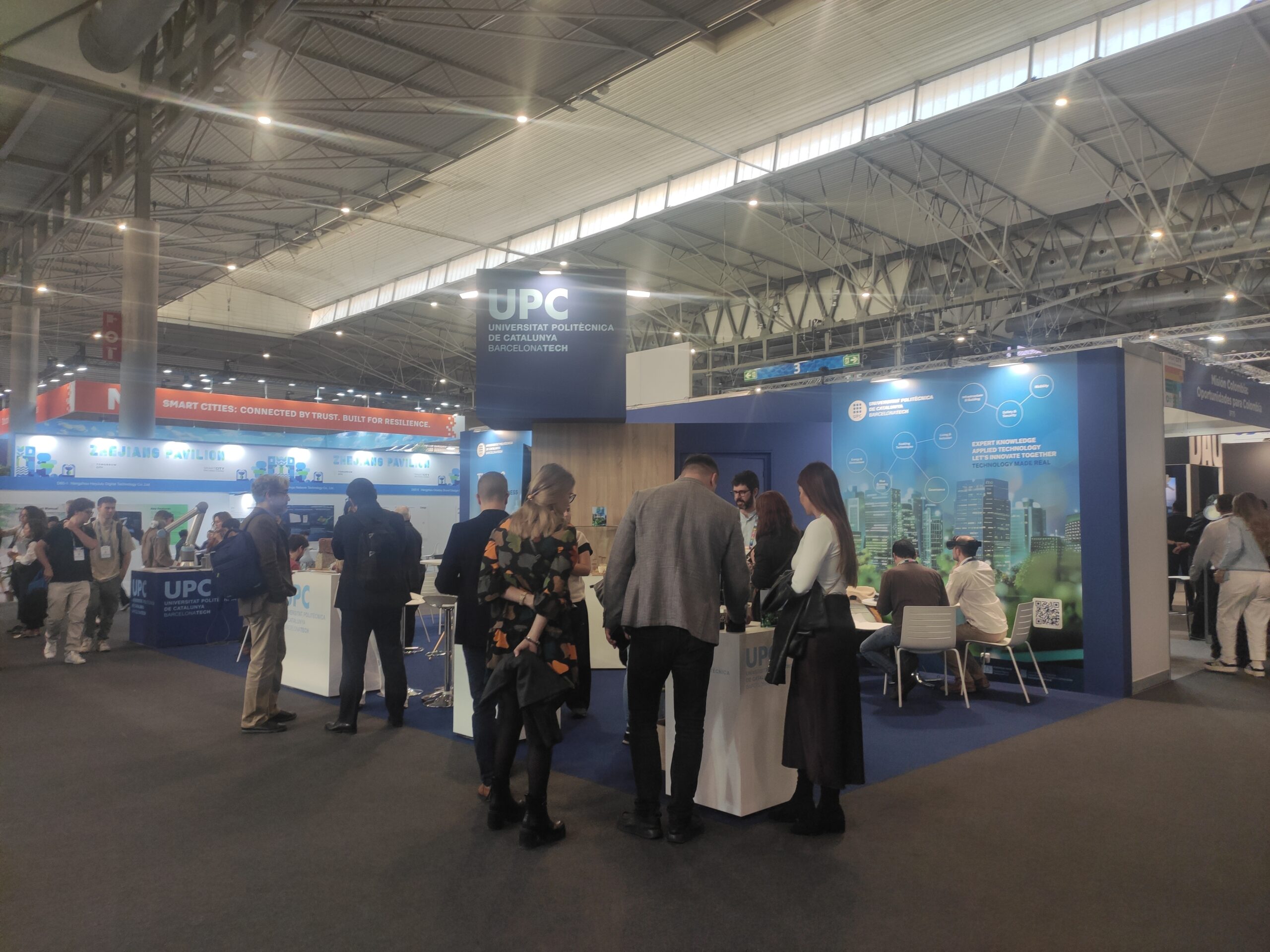
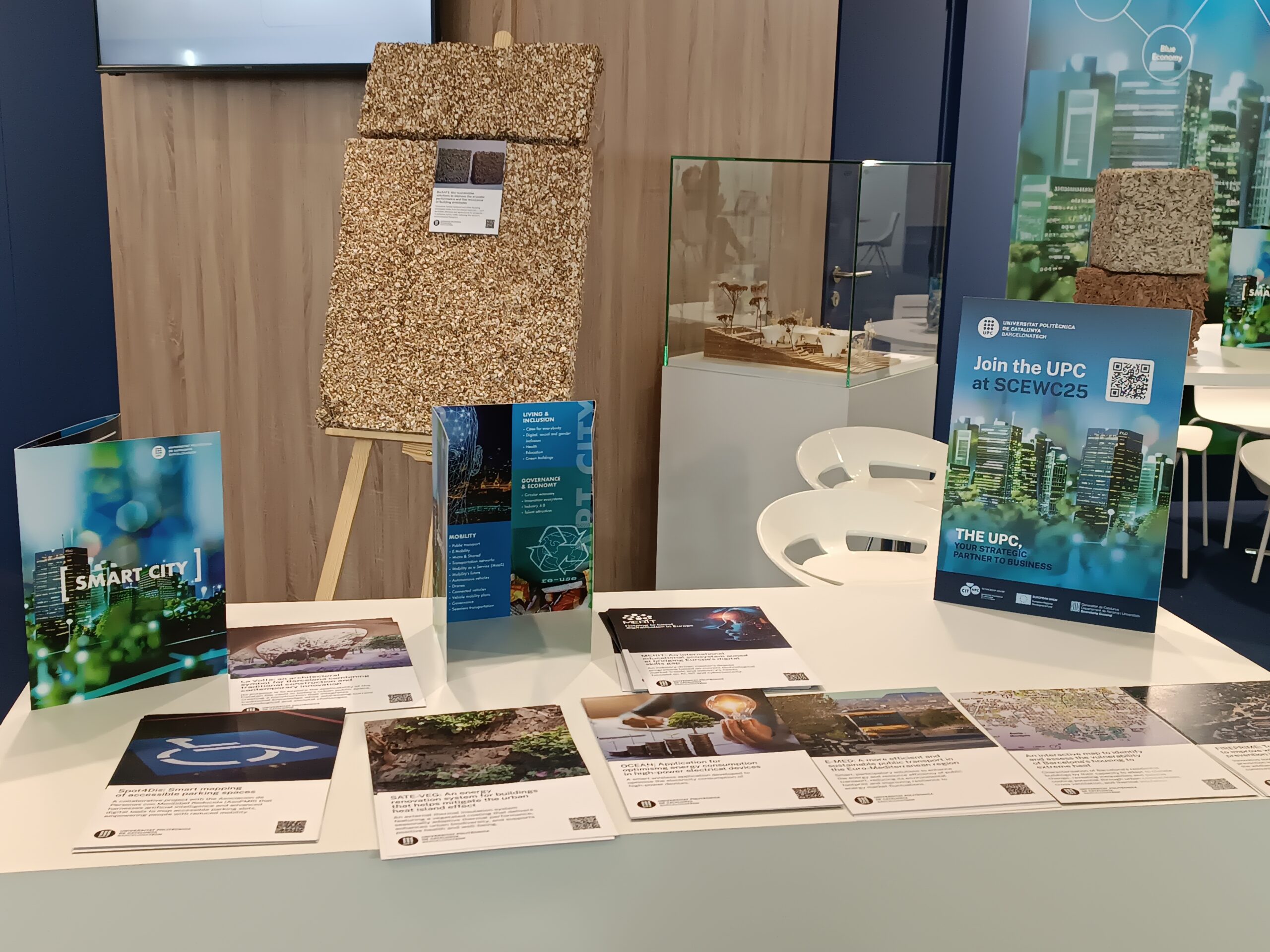
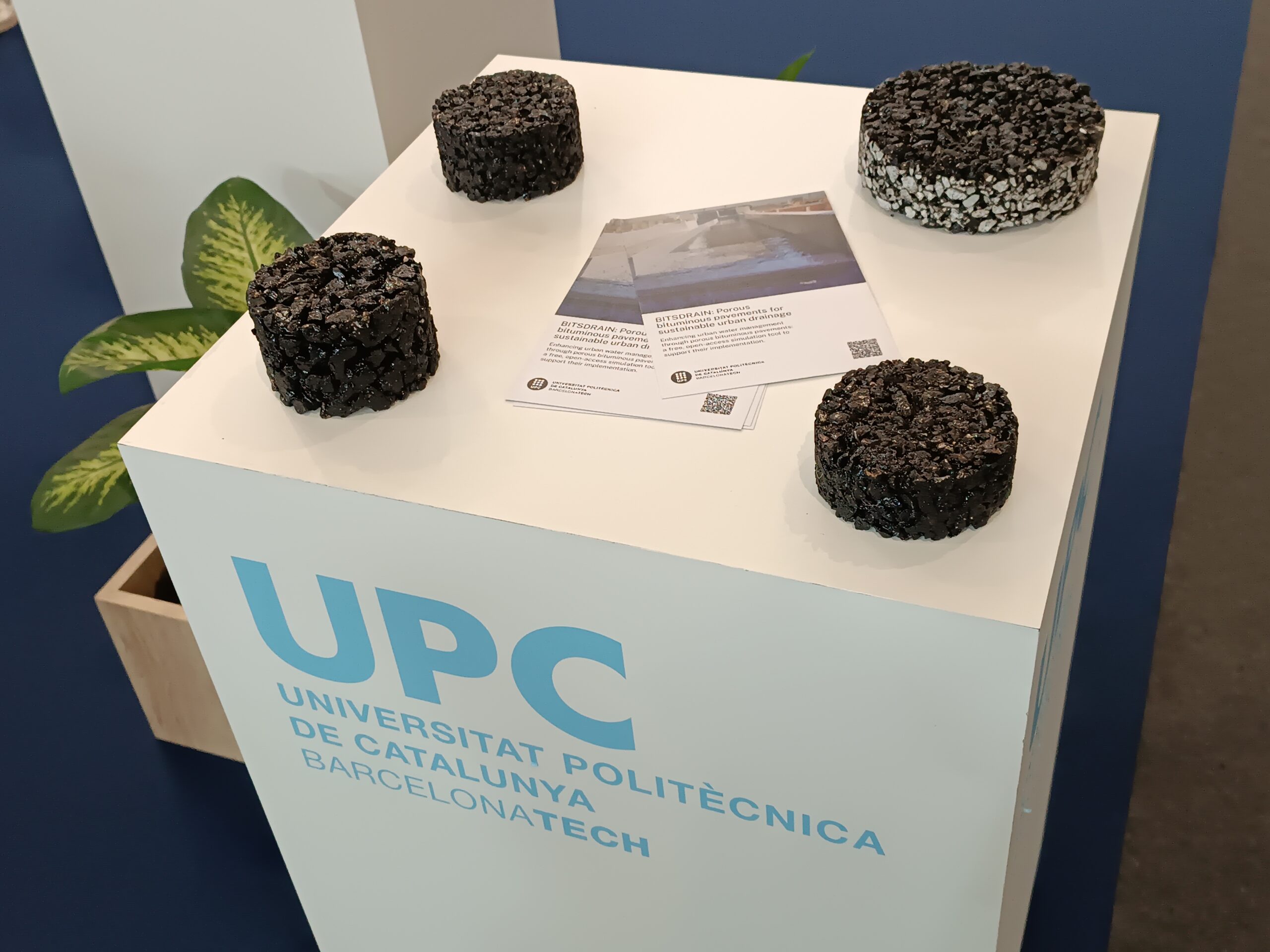
Related Projects
- A research team from the inLab FIB at the Universitat Politècnica de Catalunya - BarcelonaTech (UPC), together with the Asociación de Personas con Movilidad Reducida (AsoPMR), has taken part in the Spot4Dis project to enhance the mobility and autonomy of people with reduced mobility.
- The La Volta project foresees the construction of a large Catalan vault pergola within the Llars Mundet campus, in the Montbau neighbourhood (Horta-Guinardó district). This structure will become a new architectural landmark for Barcelona, combining traditional construction techniques with contemporary innovation. The project involves the Rehabilitation and Architectural Restoration Research Group (REARQ), at the Universitat Politècnica de Catalunya - BarcelonaTech (UPC), and is led by the Architects’ Association of Catalonia (COAC) and the Barcelona Provincial Council.
SATE-VEG: A system for energy renovation of buildings that helps reduce the urban heat island effect
Researchers from the Architecture, Energy and Environment (AiEM) group at the Universitat Politècnica de Catalunya - BarcelonaTech (UPC) have developed SATE-VEG, an external thermal insulation system with a vegetal coating that offers seasonally adaptive thermal behaviour, enhances urban biodiversity and promotes positive health effects. The system is made from organic materials, requires low maintenance and consumes minimal water.- A research team from the Interdisciplinary Group on Building Science and Technology (GICITED) at the Universitat Politècnica de Catalunya – BarcelonaTech (UPC) is leading the BioSAFE project, which aims to develop sustainable building envelopes —mainly façades— designed according to sustainability, comfort and safety criteria, with particular attention to their acoustic behaviour and fire performance.




